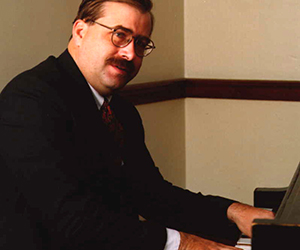
Musical accompaniment by Philip CarliPhilip Carli brings both prodigious musical talent and a committed scholarly outlook to his lifelong passion for the music and culture of the turn of the last century. He discovered silent film at the age of five and began his accompaniment career at thirteen, with a performance for Lon Chaney’s 1923 version of
The Hunchback of Notre Dame. While at college he programmed and accompanied an annual series of silent films, and also organized and conducted a 50-piece student orchestra using 19th-century performance practice. Since then, he has continued his studies of the film, music and culture of the late nineteenth and early twentieth centuries, earning a doctorate from the Eastman School of Music. He has at the same time toured extensively as a film accompanist throughout North America and Europe, performing on keyboard and with orchestra at such venues as Lincoln Center and the Museum of Modern Art in New York, the National Gallery in Washington, DC, the Cinémathèque Québécoise in Montreal, the National Film Theatre in London, and the Berlin International Film Festival. He is the staff accompanist for the George Eastman Museum in Rochester, New York, and performs annually at several film festivals in the United States as well as at Le Giornate del Cinema Muto in Italy.